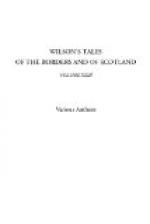These appeals were borne by Hume by the panoply of resolution. He loved Margaret as dearly, as truly as man could love woman, as a husband could love the partner of his life and fortunes. He answered with tears and embraces; but he remained true to the cause of his king and his country.
“Would you hae me, Margaret,” he said, “to disgrace mysel’ in the face o’ my townsmen? Doesna our guid king intend to leave his fair Margaret, and risk the royal bluid o’ the Bruce for the interests o’ auld Scotland? and doesna our honoured provost mean to desert, for a day o’ glory, his braw wife, that he may deck her wimple wi’ the roses o’ England, and her name wi’ a Scotch title? Wharfore, then, should I, a puir tradesman, fear to put in jeopardy for the country that bore me the life that is hers as weel as yours, and sacrifice, sae far as the guid that my arm can produce, the glory o’ my king and the character o’ my country?”
Margaret heard this speech with the most intense grief. She was incapable of argument. She was inconsolable. Her husband remained inexorable, and entreaty gave way to anger. She had adopted the idea that Hume was buoyed up with the pride of leadership; and she told him, with some acrimony, that his ambition of being thought the bravest man of Selkirk would not, in the event of his death, supply the child he was bound to work for with a bite of bread. Her love and anger carried her beyond bounds. She used other language of a harsher character, which forced her good-natured husband to retaliate in terms unusual to him, unsuited to the serious subject which they had in hand, and far less to the dangerous separation which they were about to experience. The conversation got more acrimonious. Words of a high cast produced expressions stronger still, and Hume left his wife in anger, to go to the field from which he might never return.




